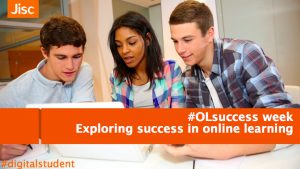Welcome to #OLsuccess day one! If you’ve landed here and are wondering what it’s all about, you might like to read the our introduction to #OLsuccess week.
Today we’re asking online learners to tell us:
What do you like about online learning?
It might be the convenience of studying at a time and place and pace that suits you. It might be that you enjoy learning with online resources. Perhaps it’s a chance to study with teachers and learners from all over the world, or to pursue a personal interest or ambition. What makes online learning a good experience for you?
Here are some of the questions we are asking on our discussion thread for this topic:
- What makes you really want to go online to learn something?
- Do you prefer to work alone online, or with other learners?
- Tell us about different kinds of online learning that you have done. What worked for you?
- Do you like to be given clear guidance on what to read and do online, or do you like to explore?
- Why have you chosen to work online (if this has been a choice)?
People are already talking about this question. From the first responses to our online survey, ‘convenience‘ is looking like a strong contender for the thing people like most about online learning. On our forum, Kamila agreed:
The number 1 reason is convenience. In your own time. At your own place. no need to go out when it’s raining. Just get a cup of tea and immerse yourself in learning. Doesn’t it sound wonderful?!
Do you feel the same? Tell us about your own experience here (it won’t take more than ten minutes).
How can I get involved?
You can go straight to the thread for this topic in our #OLsuccess forum, or you can browse the whole forum and join in with other discussions that interest you. You’ll also find a quick poll you can do.
Take our ten-minute survey about your experiences of learning online.
Follow #OLsuccess on twitter for quick questions, daily updates, stories and links
And why don’t you tell us more about what you enjoy in learning online? Write a blog post, make a video or animation, record a sound file, take a picture or take part in this week’s task from the DS106 creative community – all about online learning. Post it on your chosen online platform – youtube, vimeo, slideshare. Don’t forget to use the #OLsuccess hashtag so we can find and storify it.
#OLsuccess round up: day zero
What has happened already in #OLsuccess week? Considering we haven’t properly launched yet, there have been a lot of tweets! Most of them are inviting online learners to follow and get involved – please do. Some really interesting comments have arrived in our online forum too.
On Sunday we asked online learners ‘what do you most want to talk about this week?’ There were several responses on twitter and in our dedicated forum about learner engagement. What keeps us learning online when there are difficulties or distractions? What makes us engage deeply in the first place? There were also questions about barriers. When and why is it difficult? What negative feelings arise with online learning, for example isolation or frustration? How do learners overcome them?
Here are some thoughts from the opening hours of our blog and twitter stream.
The ability to study when I have time, fit the on-line courses into my busy schedule (work, family, voluntary work…) is probably the greatest advantage.
‘Doing a course’ (in this case a… MOOC) reinforces the decision to do it. For me, it’s harder to let it slip if it’s a course than if it’s just some reading.
Online learning is not special – it’s learning that happens to use online resources.
[I really enjoy] knowing that you are studying with people form all over the world. It is truly international. This type of education does not discriminate, it is all-inclusive regardless of race, nationality, disability.
Keep following this blog for daily round-ups and updates, and our storify or twitter hashtag #OLsuccess for an instant view of what’s being talked about.

